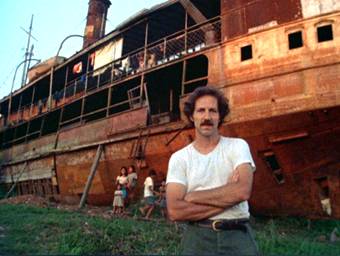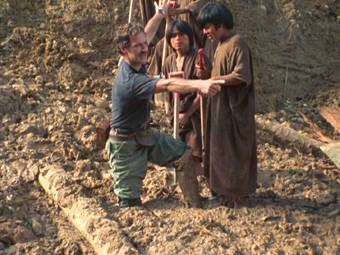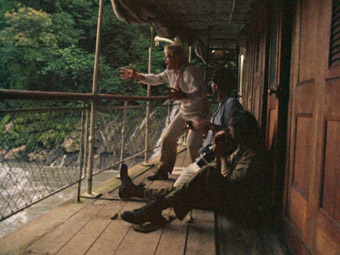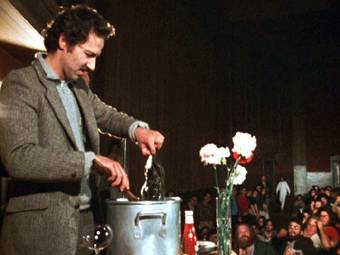| |
"When I came back to Germany and I tried to hold all the investors together, they said to me 'How can you continue? Do you have the strength or the will or the enthusiasm?' and I said 'How can you ask this question? If I abandon this project I would be a man without dreams. And I don't want to live like that.'" |
| |
Werner
Herzog |
Just
how many 'making of' documentaries get their own DVD
release? The one that springs most readily to mind is
Keith Fulton and Louis Pepe's Lost
in La Mancha, but this has to be considered
a special case, only growing into a feature after the
film whose production it was commissioned to document – Terry Gilliam's The Man Who Shot Don Quixote – collapsed
following a string of project-crippling disasters. So what does
that leave? OK, let me restate that original question
for DVD aficionados: How many making-of documentaries
get a stand-alone DVD release from US home video supremos Criterion? Yeah, Burden of Dreams is regarded that highly.
Werner Herzog's 1982 Fitzcarraldo is a film about obsession made by one of cinema's most
notorious obsessives. It was also a work that, like Gilliam's
above-mention and as-yet still unfulfilled project, ran into a spectacular series of production
problems, most of which were (often wrongly) attributed
to Herzog's single-mindedness and complete disregard
for the comfort and safety of his actors and crew. Much
of this hit the news stands while the film was in production,
prompting Herzog and his producers to ban all press
from visiting the location, which only served to feed
the negative stories about just what was going on deep
in the Amazonian jungle. The only people documenting
the shoot were ex-Berkeley graduates Les Blank and Maureen
Gosling, who had been invited in by Herzog following
his starring role in their unambiguously titled short film Werner Herzog Eats His Shoe (see the extras
below). They first joined the project late in the pre-production
for two weeks in October 1979, then returned in April 1981,
by when the film had already hit one potentially production-busting
problem, and ended up staying for two-and-a-half months. By the
time they left, Blank had become weary of the whole
experience and just wanted to get home.

Despite
the differing outcomes of the productions being documented, the similarities with Lost
in la Mancha are noteworthy, as despite Herzog's
eventual success, the film cannot help but highlight the problems with the production rather than its successes (something emphasised
by the dourly delivered narration), and it's certainly that aspect that made the biggest impression when I first saw the film back in the mid-80s.
Indeed, the memory distortion caused by the passing
of time had me convinced that the shoot was far more
problematic than it clearly was, though since then
I have also seen Hearts of Darkness (another eye-opening record of film-makers, obsession
and the jungle) and My Best Fiend,
Herzog's portrait of his friend and collaborator Klaus
Kinski. The second of those films in particular threw me off, containing
as it does an extract from Burden of Dreams showing
Kinski screaming blue murder at production manager Walter
Saxer, a scene that was not actually included in the film (again, see the extras below). By comparison, the
moments of confrontation that have been included are a lot more sedate,
and some of the most alarming incidents are related
through voice-over and interview rather than shown on screen.
As
a portrait of an obsessive perfectionist, Burden
of Dreams is consistently fascinating, and
though some have seen it as evidence of Herzog's legendary semi-lunacy, for this young ex-film student who sat open-mouthed
on that first viewing, Herzog came across as a man completely
and utterly dedicated to his vision, to the extent that he seeming willing to lay his
life on the line to realise it. I didn't appreciate it
at the time (how could I?), but he was everything I wished I was but
would ultimately never be. Of course, he had also made the staggeringly beautiful Aguirre, The Wrath of God. In my early twenties I firmly believed that Werner Herzog
was a filmmaking God.
Burden of Dreams unfolds as a study of ambition at war with a combination of circumstance,
an alien environment and even simple logic, and
in that respect is as compelling and incident-filled
as the aforementioned Hearts of Darkness and Lost in la Mancha. Without doubt
Herzog's biggest set-back occurred between Blank and
Gosling's two visits – and was thus not captured on film –
with the departure of lead players Jason Robards (illness) and Mick
Jagger (musical obligations)
after forty percent of the film had already been shot.
This meant recasting and starting again from scratch,
something that would have frankly floored most productions at this stage.
On top of that, Herzog was having to deal with an
increasingly hostile indigenous population and outrageously
false stories appearing in the press suggesting he was
running drugs and guns and destroying local farmland.
Eventually the film crew were driven out and their sets
and living quarters burned, forcing a relocation that
took them even deeper into the jungle than originally intended. Even
then Herzog was faced with the task of hauling a gigantic
steamboat over a mountain, something he insisted on doing for
real, in spite of the protestations and eventual resignation
of his Brazilian engineer and the seemingly impossible nature of the task. At this point in the production,
Herzog and Fitzcarraldo had become virtually indistinguishable
from each other, both faced with the same almost impossible
physical challenge in order to realise their respective
dreams.

Even
this, though, pales in comparison to the decision to
take the giant boat into rapids with the cast and
crew on board – as the boat collides repeatedly with
the rocks, cameraman Thomas Mauch is injured and even
Blank quits shooting in order to protect himself from
harm, creating a very real sense that Herzog's obsession
has disabled his sense of self-preservation. And yet,
by God, I wanted to be on that boat, to share the danger
in order to get footage that just no-one else would
dare to pursue. I was not at all surprised when I read
in Blank's own diaries that Herzog, Kinski and Mauch
were positively jubilant after this river trip, overcome
by the adrenaline rush of having diced with death and
survived, and knowing that they had created
something special in the process. Looking back from an age in
which spectacle is largely created on computers, the
foolhardy daring of this decision, coupled with its reckless
sense of adventure, is something to be treasured.
More
than just a record of the technical aspects and difficulties
of the Fitzcarraldo shoot, Burden
of Dreams has an ethnological element,
with the lives and even conflicts of the local tribespeople made very much part of the story. Although the
most serious incidents happen off-screen, their gravity
is nonetheless sometimes effectively communicated –
the news that a couple have been hurt in an attack
by a rival tribe is horrifically illustrated when we
are shown their injuries (which are successfully treated by the
camp's doctor) and the arrows used to inflict the wounds,
which are closer in size to what we would think of as
spears. As
the problems pile up, even Herzog shows signs of losing
heart, cursing the jungle and nature itself as obscene
in a powerful monologue laced with frustration and bitterness.
By now, though, the director has invested too much time,
energy and blood to give up, and had by then promised
that he would either finish the film or walk off into
the jungle and never return, a statement those around
him knew was sincerely made.
The
film's many strengths are retrospectively tempered to
a small degree by the additional information supplied
by the commentary and accompanying diaries and the knowledge
of what was not captured on film. Chance certainly
plays its hand here, but so does Blank's own decision
to switch the camera off at moments when others may
have kept on rolling, and Herzog himself maintains that
the film documents only a small part of the shoot and
that many key events were not caught on camera.
Blank's decision to leave the production before its completion
is understandable once you read the diaries, but it does rob
the film of Herzog's most triumphant success, when the
boat finally reached the top of the mountain. Extracts
from Fitzcarraldo are a compromise
stand-in, lacking as they do the reactions of those involved that the scene cries out for.

But
although this post-production analysis can create a
slight sense of incompletion, this has to be put into
perspective. The coverage may be greater in Lost
in La Mancha, but it is important
to remember the sheer speed with which Gilliam's film
fell apart, grinding to a halt in a matter of days, whereas
the shoot on Fitzcarraldo took several months,
and film-worthy incidents were
few and far between. That Blank and Gosling were not
there for the whole shoot is certainly a shame, but some non-chronological
editing still gives the story a suitably memorable climax
in the shape of the aforementioned hair-raising trip through the rapids,
an incident that actually occurred early in the shoot
(as evidenced by earlier shots of Thomas Mauch with
dressed wounds that he has yet to receive), but in dramatic
terms so difficult to top that its relocation feels
right.
Even
in retrospect, Burden of Dreams is
a consistently fascinating look behind the scenes of
a troubled but hugely ambitious production, providing
a window into the tortured difficulties that sometimes
go hand-in-hand with creating great cinema, and giving
us a rare glimpse of one of cinema's true mavericks
at work. Its high reputation is fully deserved,
but the film has too often been used as a stick with which
to beat both Herzog and Fitzcarraldo itself, the common cry being that the making-of documentary
is actually superior to the work whose construction
it is recording. As far as I'm concerned this is complete nonsense, as despite
being unfavourably compared to Herzog's similarly located Aguirre, the Wrath of God (and come
on, that was a work of cinematic genius, so
what chance has Herzog got there?), Fitzcarraldo is still marvellous cinema, and the passing of time has
done nothing to convince me otherwise, despite Nelson
Muntz's protestation in The Simpsons that
"The movie was flawed!" Championing a less
widely seen or distributed film as a way of taking a
poke at one that has achieved more widespread fame has
been a weary critical sport for some time, and though it
is sometimes justified, too often it is little more
than a lazy short-cut to critical hipness.* Fitzcarraldo is, in Blank's own words, "an amazing film,"
and both it and Burden of Dreams deserve
to sit side-by-side on anyone's DVD shelf.
Given
that the film was shot on 16mm negative stock (and what
looks like high speed stock at that) in often less than
ideal conditions, grain is inevitable and you certainly
get it. Colours are generally
faithful, though lean towards green due to the dominance
of the landscape and the lack of strong colours in most
shots. Contrast and black levels are fine, and the overall
look will hold no surprises for anyone familiar with
post-vérité low-budget documentary works.
Dust spots and print damage are very rare – the print
has been very effectively cleaned up for this release.
The picture is in its correct 1.33:1 aspect ratio.
The
sound is Dolby Digital 1.0 mono and is clean and distortion
free, if restricted in is dynamic range.
Though
at first glance not one of Criterion's feature-laden
releases, there are a fair number of very good extras
on offer here.

Les
Blank's 1980 short Werner Herzog Eats His Shoe (20:15), one of the films that helped land him the job
of shooting Burden of Dreams, is included
in its entirety. The result of a bet made with the then
fledgling film-maker Errol Morris (Herzog said that if
Morris ever made a feature then he would eat his shoe
– Morris made Gates of Heaven, and of course later went on to become one of the most celebrated of modern American documentarians), the
film is a light-hearted but revealing and engaging portrait
of the maverick director, who states that we should declare
open war on TV commercials (I told you he was a God) and
suggests that cooking and walking are the only viable
alternatives to film-making. Both are demonstrated on
camera, the former proving the funniest as Herzog carefully
prepares the ingredients that he will cook with the shoe
to at least give it flavour. The title event itself has
a sense of spectacle, as Herzog climbs on stage, compares
his cooked shoes to Kentucky Fried Chicken and hopes his
actions will serve as an encouragement to anyone who wants
to make a film but "doesn't have the guts,"
encouraging his audience to do whatever they have to in
order to make their films, including stealing equipment
and stock. He also recalls the time on Even
Dwarfs Started Small when he fulfilled a promise
by throwing himself into cactus, an act that he still carries the scars from.
Dreams
and Burdens (38:00) is a substantial four-part interview with
Herzog conducted in 2005, in which he looks back at the
making of Fitzcarraldo, both as he
remembers it and how it comes across in Burden
of Dreams. He talks about the casting, his relationship
with Kinski, Les Blank's films, the reasons for actually
pulling a ship over a mountain, the safety issues surrounding
it, and that trip through the rapids. He also addresses
what he believes are the strengths and weaknesses of Burden
of Dreams, which he describes as recording just
a small segment of the production and criticises for omitting
important information, but also calls it the only 'making-of'
film that is not "embarrassing." This is presented
in anamorphic 16:9.
Criterion
have usefully included a commentary track by director Les Blank and editor and sound recordist Maureen
Gosling, with Fitzcarraldo director Werner
Herzog recorded separately and edited in when appropriate.
Herzog himself notes the oddity of him commenting on a
film that is effectively a comment on him and his work,
but contributes some useful information regarding the
location and people, and his reaction to Blank and Gosling's
film, which he admires but at times wishes had never
been made. He also points out, as mentioned above, that
the film does not provide a full picture of the shoot
because Blank and Gosling simply were not present for
many key events, and claims that Blank missed some key events simply
because he overslept. He also talks about
the content of his "obscenity of nature" monologue,
making reference to what he calls the "Disneyfication
of nature" and labeling the manic Kinski as a tree-hugger.
Blank and Gosling (mainly Blank, it has to be said) provide
a useful background to the making of the film, expanding
on its ethnographical elements and confirming that many
of the natives did finally gain legal ownership of their
land and that Herzog was instrumental in making this
happen. How fresh the information seems will depend largely
on whether you listen to the commentary first or read
Blank and Gosling's diaries, as there is some overlap
here.
Two deleted scenes (5:52)
show completely opposite sides of leading man Klaus Kinski
and are presented 16:9 anamorphic as extracts from Herzog's
documentary on Kinski, My Best Fiend,
in which they were used. The aforementioned (and fascinating)
Kinski rant is counterbalanced by a quite magical sequence
in which the actor, in a state of cheerful serenity, performs
a gentle hand dance with a friendly butterfly.
The trailer (1:28) is presented
4:3, is in good shape, has the same downbeat voice-over
as the main feature and includes a few shots not in the
film itself. The '40 minutes longer' caption makes reference to
the hour-long cut-down version delivered for PBS television,
who put up some of the money.
Stills
gallery is a substantial collection of photos taken largely by
Maureen Gosling covering a wide range of subjects and
divided into 12 categories. They are reproduced at close
to full screen.
Finally
there two non-DVD-based extras in the shape of an essay
on the film by author Paul Arthur entitled In Dreams Begins Responsibilities, and an accompanying book featuring Les Blank
and Maureen Gosling's on-location diaries.
These document both visits to the location and record
not only the events and the details of day-to-day life in
the location camp, but also the attitude of the pair to
this sometimes arduous adventure. There is an overlap
with information supplied in the commentary, but this
is still enthralling reading, in part for being a non-retrospective
(and thus sometimes very directly honest) view of the
shoot.
Burden
of Dreams remains one of the most compelling visual records of the
film-making process, in part because it is about more
than that, but mainly because the its subject and participants
are just so damned interesting. That it feels a few shades
short of complete is not really a problem, as what is
there makes for fascinating viewing, and the film is very
well supported here by supplements that allow some critical
feedback from the film's principle subject, a rarity in
itself. Criterion have once again come through here, delivering
a fine DVD of a film that should prove essential viewing
for all of those interested in just how hard it is to
pull realise a cinematic dream, and just how far someone
of vision and determination will go to do so.
|